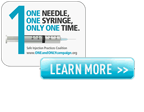How can a person go in for a routine surgery and come out with Hepatitis C?
Perhaps this is a question you have never thought to ask, and before April of 2009 it was not even in the realm of curiosity for me either. But as I entered the urgent care for what I thought might be bronchitis, only to be asked by the medical assistant, “Do you know you are yellow?” my world was immediately turned upside down. A trip to the ER and several other doctor’s visits and blood tests later confirmed I had Hepatitis C.
The diagnosis hit me like a ton of bricks. This could kill me, right? This was my first thought and then I thought of Lucy, my 1-year-old daughter. Had I also infected her? What would she do if something happened to me? As a single parent I did have a plan in case but never in my wildest dreams did I think I would ever need to use it. Hepatitis C? How does a healthy 41-year-old get Hepatitis C? No IV drug use, no blood transfusions, no sexual partners who may have been exposed.
I was relentless in my pursuit to get answers: how did this happen and how do I get rid of it? But I suppose now I realize I was simply asking the wrong questions. I had had a routine surgery about 6 weeks prior and although I noted this in every interview by every healthcare professional, they were slow to connect the two. But I kept going back to the same conclusion, why could it not be the hospital? But the scarier question was if I was infected, how do we know others were not as well?
The news broke in the beginning of July about the arrest. A hospital employee who had tested positive for Hepatitis C had been diverting syringes of fetanyl, injecting herself and then filling the syringe with saline and putting them back on surgical trays to be administered to patients. I was one of dozens of patients who had fallen prey to her deadly scheme. I was one of thousands of patients who might have been infected because a surgical tech was able to figure a way to fool the hospital systems and feed her addiction with no concern for patient safety.
The system at the hospital had been very broken and thousands of patients and hospital employees were put at risk. And while it was easy to say this was the work of one rogue employee, I knew this was not the case. If the system were not fixed, more people would be in harms way. So I began to speak out to anyone who would listen. I began to tell my story and help the public to understand I was just like them. I went in for a simple surgical procedure and I came out with Hepatitis C. If it had happened to me, it could happen to them and changes needed to be made.
In Colorado, in late 2008 through the spring of 2009 18 patients were infected with Hepatitis C and thousands of others worried they might have been exposed. Some of us cleared the virus, some of us went through the 48 weeks of treatment as harsh and debilitating as cancer treatments and others found themselves clear of the virus after one test only to find it had reoccurred in a later test. The strain was virulent in nature and many of the victims found preexisting conditions rearing their ugly heads and the older victims wondered how much time they had left.
And with any outbreak like the one which happened to us in Colorado, there is the ripple effect not just involving the victims, but also their families and other loved ones. The anger, the sadness, the confusion continues well past the diagnosis and prognosis. The lack of trust in the healthcare system as a whole endures. You are left to wonder, who is watching out for me? Who will keep us safe?
While those are fine questions to ask, I still believe there is so much to do, more education, better laws and better questions. So now I ask, what else can I do to keep others safe?






reply Karen Morrow ,
Sharing our stories is crucial to awareness which leads to steps being taken to preventing these types of situations from reoccurring. Thank you, Lauren, for sharing your story. It is emotional and heartbreaking. I know it was difficult for you, and I sincerely appreciate your strength.
Karen Morrow, Patient Advocate